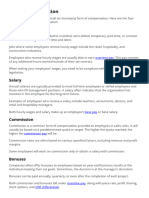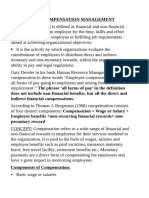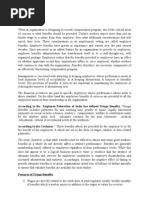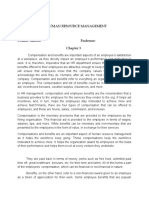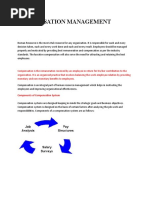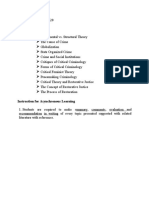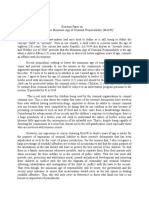0 ratings0% found this document useful (0 votes)
36 viewsSignificance of Compensation
Significance of Compensation
Uploaded by
Charmis TubilCompensation refers to the monetary rewards provided to employees in exchange for their work, and is designed to attract and retain talent. Benefits are additional non-monetary rewards such as health insurance, vacation time, and housing assistance that are provided alongside cash compensation to improve employee welfare and motivation. There are different types of benefit packages that employees can choose from. While compensation is performance-based, benefits are membership-based and not contingent on performance. The goals of benefits are to improve employee satisfaction, attract new employees, and retain current staff, while compensation aims to attract and retain talented workers.
Copyright:
© All Rights Reserved
Available Formats
Download as DOCX, PDF, TXT or read online from Scribd
Significance of Compensation
Significance of Compensation
Uploaded by
Charmis Tubil0 ratings0% found this document useful (0 votes)
36 views6 pagesCompensation refers to the monetary rewards provided to employees in exchange for their work, and is designed to attract and retain talent. Benefits are additional non-monetary rewards such as health insurance, vacation time, and housing assistance that are provided alongside cash compensation to improve employee welfare and motivation. There are different types of benefit packages that employees can choose from. While compensation is performance-based, benefits are membership-based and not contingent on performance. The goals of benefits are to improve employee satisfaction, attract new employees, and retain current staff, while compensation aims to attract and retain talented workers.
Original Description:
EMPLOYEE COMPENSATION
Original Title
Significance of compensation
Copyright
© © All Rights Reserved
Available Formats
DOCX, PDF, TXT or read online from Scribd
Share this document
Did you find this document useful?
Is this content inappropriate?
Compensation refers to the monetary rewards provided to employees in exchange for their work, and is designed to attract and retain talent. Benefits are additional non-monetary rewards such as health insurance, vacation time, and housing assistance that are provided alongside cash compensation to improve employee welfare and motivation. There are different types of benefit packages that employees can choose from. While compensation is performance-based, benefits are membership-based and not contingent on performance. The goals of benefits are to improve employee satisfaction, attract new employees, and retain current staff, while compensation aims to attract and retain talented workers.
Copyright:
© All Rights Reserved
Available Formats
Download as DOCX, PDF, TXT or read online from Scribd
Download as docx, pdf, or txt
0 ratings0% found this document useful (0 votes)
36 views6 pagesSignificance of Compensation
Significance of Compensation
Uploaded by
Charmis TubilCompensation refers to the monetary rewards provided to employees in exchange for their work, and is designed to attract and retain talent. Benefits are additional non-monetary rewards such as health insurance, vacation time, and housing assistance that are provided alongside cash compensation to improve employee welfare and motivation. There are different types of benefit packages that employees can choose from. While compensation is performance-based, benefits are membership-based and not contingent on performance. The goals of benefits are to improve employee satisfaction, attract new employees, and retain current staff, while compensation aims to attract and retain talented workers.
Copyright:
© All Rights Reserved
Available Formats
Download as DOCX, PDF, TXT or read online from Scribd
Download as docx, pdf, or txt
You are on page 1of 6
Significance of compensation
Compensation is very important in the organization. It is
specifically designed to attract as well as to retain talent within the
organization. It also focuses on utilizing employee energy to gain
competitive strategy while at the same time trying to control costs
at desired levels. Attractive compensation helps to improve job
satisfaction among the employees. This is advantageous to the
organization since this leads to low absenteeism and low turnover
since satisfied workers are willing to stay in their respective
organizations.
Key features of Benefits
During the current period, it can be noted that employees expect
to earn extra apart from cash alone. This is known as benefits and
some people prefer to call them fringe benefits and they are non-
monetary form of compensation. Benefits are offered on top of the
cash pay to the employees in a bid to improve the welfare of the
employees as well as to motivate them.
Types of benefits packages
There are different types of benefit packages and employees have
the opportunity to choose benefit packages that suit their needs.
Some benefits are required by law and these include sick
and holiday pay as well as unemployment compensation. On the
other hand, it can be observed that employees can choose their
desired benefit packages from the following: vacation, health
insurance, company housing, subsidized meals as well as
educational funding for children. In some cases, benefits depend
on one’s level within the company.
Performance
Workers receive benefits regardless of their performances. In
other words, benefits are not performance based but membership
based. The other notable aspect about employee benefits is that
they usually do not affect the performance of the employees
though in some case they can lead to low satisfaction and lead to
absenteeism and ultimately turnover if they are insufficient. Care
should be taken when designing the benefit package since this can
impact the employees if the benefits are not satisfactory. It is also
important to consider associated costs.
Goals of benefits
Benefit plans are specifically designed to fulfill the needs of the
employees and they are also oriented towards the overall
objectives of the organization. Some of the goals of offering
employee benefits include the following: improve employee
satisfaction, attract new employees as well as to satisfy the
employees already working within the company.
Read more: Difference Between Compensation and Benefits |
Difference
Between http://www.differencebetween.net/business/difference-
between-compensation-and-benefits/#ixzz7Rtg39OZQ
Table indicating the differences between compensation
and benefits
Compensation
Monetary value
Compensation is performance based
Employees cannot determine their compensation
In piece-rate compensation plan, pay determined by contribution made
Meant to attract as well as to retain talented workers.
Pay offered on weekly, fortnight as well as monthly basis
Summary of the main differences between
compensation and benefits
Compensation and benefits are somehow related but upon closer
analysis, these two concepts are different. Some of the major
differences between benefits and compensation are summarized
below.
Nature of compensation and benefits
Compensation is monetary value paid to the employee for work
done.
Benefits are non monetary and they are an indirect form of
compensation offered on top of cash pay.
Types of compensation and benefits
There are different types of compensation and they include the
following: basic compensation offered on weekly, fortnight or
monthly basis. The other type is commission based compensation
which is determined by level of revenue generated from sales of a
particular commodity.
Some forms of benefits are required by law such as
unemployment compensation, sick as well as holiday pay.
Employees can also choose desire benefit package from health
insurance, vacation, subsidized meals as well as company housing
among others.
Performance
Compensation is performance based. This can be based on
individual, group or organizational performance where employees
are given bonuses for outstanding performance.
Benefits are not based on performance but they are membership
based. The employees are entitled to their benefits regardless of
performance.
Employee choice on compensation and benefits
Employees cannot determine their own salaries. Factors such as
level of qualification and experience are often taken into account
when determining the level of compensation awarded to a specific
individual within the company.
On the other hand employees can choose their benefit packages as
they see fit since they are the ones who know what they exactly
need.
Goals
Compensation is meant to attract as well as to retain employees
within the organization. Skilled employees should offered
lucrative pay in order for them to remain in the organization.
Benefits on the other hand are meant to improve employee
satisfaction, improving their welfare as well as motivating them so
that they can improve job satisfaction. All these factors are good
for the employees since they stay for long period in the
organization.
Conclusion
In conclusion, it can be stated that benefits and compensation are
somehow related since they have something to do with
compensating employees in particular for the work performed.
However, as discussed above, these two concepts are different.
The main difference between the two is that compensation is
monetary based while benefits include other gains that are non
monetary. Compensation itself is performance based and it is
designed to attract as well as to retain the already existing
employees in the organization. In contrast, benefits are
membership based and employees are entitled to them and
employees can choose their desired benefit package. Benefits are
also designed to improve job satisfaction as well as to motivate the
employees within the organization to improve their performance.
Read more: Difference Between Compensation and Benefits |
Difference
Between http://www.differencebetween.net/business/difference-
between-compensation-and-benefits/#ixzz7RtfyiIr3
Read more: Difference Between Compensation and Benefits |
Difference
Between http://www.differencebetween.net/business/difference-
between-compensation-and-benefits/#ixzz7RtfwQcOm
Read more: Difference Between Compensation and Benefits |
Difference
Between http://www.differencebetween.net/business/difference-
between-compensation-and-benefits/#ixzz7Rtft1GMa
You might also like
- CCIE Enterprise Infrastructure Lab 1 Demo 2Document52 pagesCCIE Enterprise Infrastructure Lab 1 Demo 2ibrahin VargasNo ratings yet
- Compensation Management NoteDocument57 pagesCompensation Management NoteAishwaryaSantoshNo ratings yet
- HDFC Bank QuestionnaireDocument25 pagesHDFC Bank QuestionnaireIesha GuptaNo ratings yet
- Activity 4 Business Marketing-Pricing StrategyDocument4 pagesActivity 4 Business Marketing-Pricing StrategyCharmis TubilNo ratings yet
- Activity 6 Media LiteratureDocument4 pagesActivity 6 Media LiteratureCharmis TubilNo ratings yet
- Buwan at Baril Sa Ej Major by Chris MilladoDocument8 pagesBuwan at Baril Sa Ej Major by Chris MilladoFaith CalisuraNo ratings yet
- Chapter 5 Compensation and BenefitDocument29 pagesChapter 5 Compensation and BenefitMarc Franz R. BurceNo ratings yet
- Compensation Management & Human Resources Development BBA III NotesDocument80 pagesCompensation Management & Human Resources Development BBA III Notessaniyainmdr.inNo ratings yet
- Compensation ManagementDocument22 pagesCompensation ManagementVidyaNo ratings yet
- ASSIGNMENTDocument3 pagesASSIGNMENThusna harunaNo ratings yet
- Master of Business AdministrationDocument5 pagesMaster of Business AdministrationShubham MathurNo ratings yet
- 1513934833Mod25Q1financialandnon FinancialcompensationDocument11 pages1513934833Mod25Q1financialandnon FinancialcompensationAjith KumarNo ratings yet
- CPM 6th Sem NotesDocument81 pagesCPM 6th Sem Notesnithinmr776No ratings yet
- HRM-RECDocument22 pagesHRM-RECpatdocameronjhadeNo ratings yet
- Compensation: Compensation Refers To A Reward Paid To An Employee For The Work They Do For AnDocument6 pagesCompensation: Compensation Refers To A Reward Paid To An Employee For The Work They Do For AnbonyNo ratings yet
- Compensation and WagesDocument52 pagesCompensation and Wageskristine collins YambaoNo ratings yet
- HRM-Compensation Management HandoutDocument6 pagesHRM-Compensation Management HandoutSaad Saeed100% (1)
- Difference Between Compensation and BenefitsDocument5 pagesDifference Between Compensation and BenefitsAIMA zulfiqarNo ratings yet
- Essentials of Compensation in PakistanDocument6 pagesEssentials of Compensation in PakistanabubakarNo ratings yet
- Types of CompensationDocument4 pagesTypes of CompensationLoren Manda100% (1)
- ESOPDocument40 pagesESOPsimonebandrawala9No ratings yet
- Strategic Human Resource 001003Document81 pagesStrategic Human Resource 001003Fullertron IndiaNo ratings yet
- Assignment of Human Resource Management (HRM)Document7 pagesAssignment of Human Resource Management (HRM)Haroon KhanNo ratings yet
- Synopsis of CompensationDocument15 pagesSynopsis of CompensationShipra Jain0% (2)
- Compensation ManagementDocument17 pagesCompensation ManagementArafatNo ratings yet
- CompensationDocument19 pagesCompensationKS Biplob100% (1)
- HRM 2Document14 pagesHRM 2ShanNo ratings yet
- CompensationDocument4 pagesCompensationalyssa.reazo.gsbmNo ratings yet
- Compensation Is The Results or Rewards That The EmployeesDocument8 pagesCompensation Is The Results or Rewards That The EmployeeskomalNo ratings yet
- Compensation and Reward ManagementDocument5 pagesCompensation and Reward ManagementAaron PraneethNo ratings yet
- HR Assigmnet HanaDocument4 pagesHR Assigmnet HanasacadabdiNo ratings yet
- Differentiate Incentives and BenefitsDocument1 pageDifferentiate Incentives and BenefitsJonathan Adones B. EstrellerNo ratings yet
- CM-Module 1Document15 pagesCM-Module 1Prabhat Kumar SwainNo ratings yet
- Bba 202 SM12Document11 pagesBba 202 SM12Vedant SharmaNo ratings yet
- CompensastionDocument11 pagesCompensastionAnkush At Shiv ShaktiNo ratings yet
- RCM UNIT I NOTESDocument68 pagesRCM UNIT I NOTESmadhanraj28.mrNo ratings yet
- Components of Compensation:-Basic Wages/salariesDocument4 pagesComponents of Compensation:-Basic Wages/salariesVikas JhaNo ratings yet
- MBA HRM UNIT - 4-WPS OfficeDocument11 pagesMBA HRM UNIT - 4-WPS Officeharshitagarwal8898No ratings yet
- Compensation N BenfitsDocument52 pagesCompensation N BenfitsShalaka MohiteNo ratings yet
- CH 17 Compensation ManagementDocument7 pagesCH 17 Compensation ManagementMD. AL HossainNo ratings yet
- Reward System Compensation and Non-compensationDocument23 pagesReward System Compensation and Non-compensationAvi BansalNo ratings yet
- The Management of Employee Benefits and Services 240415151205 Ba30c4b4Document33 pagesThe Management of Employee Benefits and Services 240415151205 Ba30c4b4poligroj24No ratings yet
- Com MGT chp#1Document3 pagesCom MGT chp#1tajjamulspamNo ratings yet
- Fixed Pay and Variable PayDocument3 pagesFixed Pay and Variable PaySabarish .SNo ratings yet
- Definition of BenefitDocument7 pagesDefinition of BenefitRokon Uddin AhmedNo ratings yet
- Employee CompensationDocument75 pagesEmployee CompensationGitu SinghNo ratings yet
- Compensating Human ResourcesDocument13 pagesCompensating Human ResourcesM RABOY,JOHN NEIL D.No ratings yet
- Bsoapersonnel - AdministrationDocument3 pagesBsoapersonnel - AdministrationCarmina DongcayanNo ratings yet
- CH 7Document5 pagesCH 7hailu mekonenNo ratings yet
- HRM-Compensation and BenefitsDocument2 pagesHRM-Compensation and BenefitsAndrew PonteNo ratings yet
- Chapter 4Document3 pagesChapter 4Angeline SarcenoNo ratings yet
- BAHR 222 - Week 1-2Document16 pagesBAHR 222 - Week 1-2Prescious Joy Donaire100% (1)
- Employee Reward and Recognition SystemsDocument6 pagesEmployee Reward and Recognition SystemsKarthi KeyanNo ratings yet
- COMPENSATIONDocument12 pagesCOMPENSATIONAbinash M100% (1)
- Compensation AdministrationDocument4 pagesCompensation AdministrationKristine Collins Llorin YambaoNo ratings yet
- Compensation and BenefitsDocument59 pagesCompensation and BenefitsOscar CanchéNo ratings yet
- Planning An Employee Benefits Program (Various Perspectives)Document20 pagesPlanning An Employee Benefits Program (Various Perspectives)Xtian PastorinNo ratings yet
- Compensation ManagementDocument12 pagesCompensation Managementrithikapallewar1No ratings yet
- The Different Forms of CompensationDocument18 pagesThe Different Forms of CompensationRajan KashyapNo ratings yet
- Introduction To CompensationDocument105 pagesIntroduction To CompensationgedorjeramNo ratings yet
- Compensation Management: Components of Compensation SystemDocument11 pagesCompensation Management: Components of Compensation Systembinit1488No ratings yet
- Pay and Service ConditionsDocument12 pagesPay and Service Conditionsifuture2047No ratings yet
- Unit 4 Compensation Structures and Benefits ( Detailed Notes )From EverandUnit 4 Compensation Structures and Benefits ( Detailed Notes )No ratings yet
- Manual Sample For Intellectual PolicyDocument17 pagesManual Sample For Intellectual PolicyCharmis TubilNo ratings yet
- The Central Processing UnitDocument4 pagesThe Central Processing UnitCharmis TubilNo ratings yet
- What Is RandomDocument3 pagesWhat Is RandomCharmis TubilNo ratings yet
- Thematic Analysis inDocument7 pagesThematic Analysis inCharmis Tubil100% (1)
- Types of Special Occasion SpeechesDocument11 pagesTypes of Special Occasion SpeechesCharmis Tubil100% (1)
- Lecture 4 - CSS MotherboardDocument3 pagesLecture 4 - CSS MotherboardCharmis TubilNo ratings yet
- Sample - QMS-P001 Control-Of-Documented-InformationDocument8 pagesSample - QMS-P001 Control-Of-Documented-InformationCharmis TubilNo ratings yet
- Police Stress, Mental Health - COVID 19 STUDYDocument13 pagesPolice Stress, Mental Health - COVID 19 STUDYCharmis TubilNo ratings yet
- Termination of Employment in The 2Document5 pagesTermination of Employment in The 2Charmis TubilNo ratings yet
- BCG-Manager-Extension-Communications - SAMPLE JOB QUALI AND KRA KPIDocument5 pagesBCG-Manager-Extension-Communications - SAMPLE JOB QUALI AND KRA KPICharmis TubilNo ratings yet
- This Is A List of Popular English ProverbsDocument6 pagesThis Is A List of Popular English ProverbsCharmis TubilNo ratings yet
- Swot Analysis - Critical Feminist TheoryDocument4 pagesSwot Analysis - Critical Feminist TheoryCharmis Tubil100% (1)
- SWOT ANALYSIS - Legal Framework in Responding Domestic ViolenceDocument9 pagesSWOT ANALYSIS - Legal Framework in Responding Domestic ViolenceCharmis TubilNo ratings yet
- Swot Analysis - Transnational CrimeDocument14 pagesSwot Analysis - Transnational CrimeCharmis Tubil100% (1)
- Reaction Paper On VictimologyDocument6 pagesReaction Paper On VictimologyCharmis TubilNo ratings yet
- Activity 5 Business Around Me - Business EthicsDocument3 pagesActivity 5 Business Around Me - Business EthicsCharmis TubilNo ratings yet
- Abm Research Social Media Addiction How It Destroy Student's Time ManagementDocument53 pagesAbm Research Social Media Addiction How It Destroy Student's Time ManagementCharmis Tubil100% (1)
- Reaction Paper On TerrorismDocument4 pagesReaction Paper On TerrorismCharmis TubilNo ratings yet
- Attendance and Punctuality Policy: Procedure ManualDocument14 pagesAttendance and Punctuality Policy: Procedure ManualCharmis TubilNo ratings yet
- Reaction Paper On Juvenile DelinquencyDocument4 pagesReaction Paper On Juvenile DelinquencyCharmis TubilNo ratings yet
- Math ReviewerDocument64 pagesMath Revieweragnes.deguzmanNo ratings yet
- Grodan Brochure Vital V1 ENDocument2 pagesGrodan Brochure Vital V1 ENBraulio HerreraNo ratings yet
- CL210 RHOSP 13.0 en 1 20181129 TOCDocument2 pagesCL210 RHOSP 13.0 en 1 20181129 TOCravi kantNo ratings yet
- JCB in IndiaDocument2 pagesJCB in IndiaAnnie100% (2)
- Introduction To Software TestingDocument52 pagesIntroduction To Software TestingChester PhaleviNo ratings yet
- Advanced Excel Formulas PDF FreeDocument342 pagesAdvanced Excel Formulas PDF FreeSabhanathan SadasivamNo ratings yet
- Dlplus Mini-Trunking: New Standard en 50085-2-1 / Iec 61084-2-1Document1 pageDlplus Mini-Trunking: New Standard en 50085-2-1 / Iec 61084-2-1rg cpeccNo ratings yet
- 6c7f5ec8 1643863161253Document38 pages6c7f5ec8 1643863161253Akshay GuptaNo ratings yet
- 4GB GDDR5, 256b, 128Mx32 Tall Dvi-I + DP + DP + Dp/Hdmi + DPDocument37 pages4GB GDDR5, 256b, 128Mx32 Tall Dvi-I + DP + DP + Dp/Hdmi + DPA Meza BautiztaNo ratings yet
- Troubleshooting Textiles What Causes Pilling Redeposition ShrinkageDocument3 pagesTroubleshooting Textiles What Causes Pilling Redeposition ShrinkageMohammed Atiqul Hoque ChowdhuryNo ratings yet
- G.S.D. Operation: AllowancesDocument3 pagesG.S.D. Operation: AllowancesJahangir Alam SohagNo ratings yet
- Linguistic Analysis of Newspaper Headlines Focus On DifferencesDocument5 pagesLinguistic Analysis of Newspaper Headlines Focus On Differencesالمحتوى- EverythingNo ratings yet
- AC Vs DC Power Distribution in The Data CenterDocument21 pagesAC Vs DC Power Distribution in The Data CenterJonathan SantiagoNo ratings yet
- 2008 Basics DDM FEADocument24 pages2008 Basics DDM FEAwhateverNo ratings yet
- Time and Frequency DomainsDocument5 pagesTime and Frequency DomainsAlemat TesfayNo ratings yet
- The Effectivity of Cloud Chamber in Detecting StrayDocument11 pagesThe Effectivity of Cloud Chamber in Detecting StrayNor Jhon BruzonNo ratings yet
- Research About Microcontrollers and MicroprocessorsDocument6 pagesResearch About Microcontrollers and MicroprocessorsBraulio BolañosNo ratings yet
- Black Elk's Great VisionDocument13 pagesBlack Elk's Great VisionCidadaun AnônimoNo ratings yet
- DessertationDocument31 pagesDessertation9752168596No ratings yet
- Heavy Industries Taxila ReportDocument46 pagesHeavy Industries Taxila ReportAitazaz Ahsan100% (2)
- 8604 Unit 5 Revised Descriptive Research Design 1-1Document29 pages8604 Unit 5 Revised Descriptive Research Design 1-1amirkhan30bjrNo ratings yet
- CSR 201213Document3 pagesCSR 201213Naveen SagaNo ratings yet
- Point of ViewDocument12 pagesPoint of Viewidana1No ratings yet
- Epping To Chatswood Rail 2Document4 pagesEpping To Chatswood Rail 2harleyNo ratings yet
- The Essential Guide To Food TestingDocument4 pagesThe Essential Guide To Food TestingEquinox LabNo ratings yet
- Model Question PaperDocument2 pagesModel Question PaperAjay KumarNo ratings yet
- Day10Async - Selection & Performance Appraisal and Management - Kier MangubatDocument22 pagesDay10Async - Selection & Performance Appraisal and Management - Kier Mangubat6363.mangubatNo ratings yet
- Saba Naheed - Linguistic Heterogeneity and Multilinguality in India-A Linguistic Assessment of Indian Language PoliciesDocument250 pagesSaba Naheed - Linguistic Heterogeneity and Multilinguality in India-A Linguistic Assessment of Indian Language PoliciessreenathpnrNo ratings yet



























